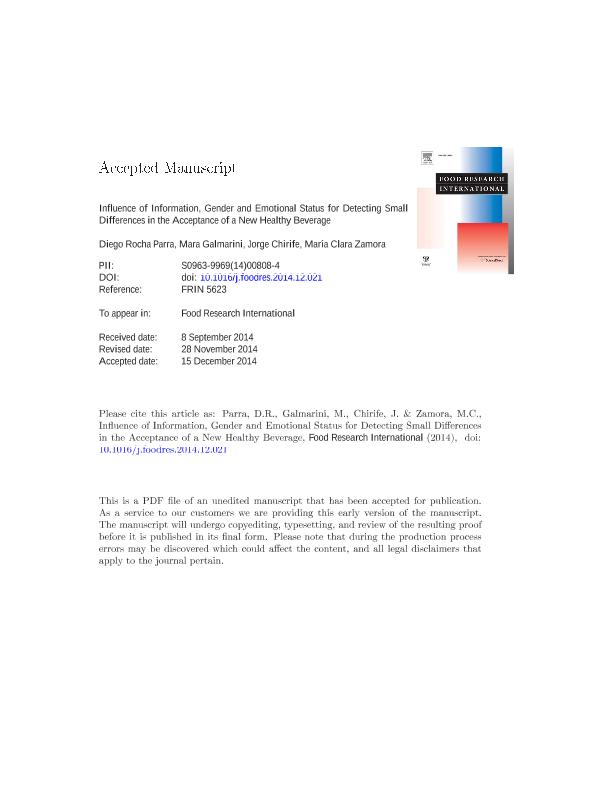Mostrar el registro sencillo del ítem
dc.contributor.author
Rocha Parra, Diego Fernando

dc.contributor.author
Galmarini, Mara Virginia

dc.contributor.author
Chirife, Jorge

dc.contributor.author
Zamora, María Clara

dc.date.available
2020-01-13T14:15:05Z
dc.date.issued
2015-10
dc.identifier.citation
Rocha Parra, Diego Fernando; Galmarini, Mara Virginia; Chirife, Jorge; Zamora, María Clara; Influence of information, gender and emotional status for detecting small differences in the acceptance of a new healthy beverage; Elsevier Science; Food Research International; 76; 10-2015; 269-276
dc.identifier.issn
0963-9969
dc.identifier.uri
http://hdl.handle.net/11336/94481
dc.description.abstract
Moderate wine consumption has been recommended as a health benefits practice, although alcohol content is sometimes the main factor for rejecting its consumption. This study focuses on the development of a fruit flavored powder beverage, having the same polyphenols of wine but without the alcohol content. The specific aim of the present work was to evaluate if the factors gender and information regarding health benefits could have some influence on consumer decisions while evaluating preference of samples with small formulation differences. In addition, emotional status and comments about likes and dislikes of the beverages were also investigated. For this purpose, one hundred and forty-four consumers (70 females and 74 males; aged 19 to 35 years old, M = 23.3, SD = 4.0) gave their degree of acceptance for four beverages. Each drink contained different levels of a powder concentrate of red wine (35 and 40 g/L) and sweetener (4 and 5 g/L). The participants estimated first by a 9-point category scale and, then by Visual Analogue Scales (VAS) the following attributes: acceptance, appearance, aroma, sweetness, flavor, acidity and astringency. Having two scales allowed the study to double check consumer evaluations. Results showed that the acceptance scores among formulations only showed significant differences with the 9-point category scale. The cross study presented the highest divergences by gender factor. Males gave similar or higher values when confirming the evaluation using the second scale. Conversely, females gave similar or lower values in the same conditions. Thus, the double scale strategy highlighted the differences of the target population. Even though information of health benefits did not increase the acceptance of the new beverage, it had a different impact between males and females. The emotions chosen by the consumers to describe their feelings about the new beverage helped to explain the acceptance data.
dc.format
application/pdf
dc.language.iso
eng
dc.publisher
Elsevier Science

dc.rights
info:eu-repo/semantics/openAccess
dc.rights.uri
https://creativecommons.org/licenses/by-nc-sa/2.5/ar/
dc.subject
ALCOHOL
dc.subject
DRINK POWDER
dc.subject
EMOTIONS
dc.subject
HEALTH
dc.subject
WINE
dc.subject.classification
Otras Ciencias Químicas

dc.subject.classification
Ciencias Químicas

dc.subject.classification
CIENCIAS NATURALES Y EXACTAS

dc.subject.classification
Otras Ciencias Químicas

dc.subject.classification
Ciencias Químicas

dc.subject.classification
CIENCIAS NATURALES Y EXACTAS

dc.title
Influence of information, gender and emotional status for detecting small differences in the acceptance of a new healthy beverage
dc.type
info:eu-repo/semantics/article
dc.type
info:ar-repo/semantics/artículo
dc.type
info:eu-repo/semantics/publishedVersion
dc.date.updated
2019-12-27T14:01:19Z
dc.journal.volume
76
dc.journal.pagination
269-276
dc.journal.pais
Países Bajos

dc.journal.ciudad
Amsterdam
dc.description.fil
Fil: Rocha Parra, Diego Fernando. Consejo Nacional de Investigaciones Científicas y Técnicas; Argentina. Pontificia Universidad Católica Argentina "Santa María de los Buenos Aires"; Argentina
dc.description.fil
Fil: Galmarini, Mara Virginia. Pontificia Universidad Católica Argentina "Santa María de los Buenos Aires"; Argentina. Consejo Nacional de Investigaciones Científicas y Técnicas; Argentina
dc.description.fil
Fil: Chirife, Jorge. Pontificia Universidad Católica Argentina "Santa María de los Buenos Aires"; Argentina
dc.description.fil
Fil: Zamora, María Clara. Consejo Nacional de Investigaciones Científicas y Técnicas; Argentina. Pontificia Universidad Católica Argentina "Santa María de los Buenos Aires"; Argentina
dc.journal.title
Food Research International

dc.relation.alternativeid
info:eu-repo/semantics/altIdentifier/url/https://www.sciencedirect.com/science/article/pii/S0963996914008084
dc.relation.alternativeid
info:eu-repo/semantics/altIdentifier/doi/http://dx.doi.org/10.1016/j.foodres.2014.12.021
Archivos asociados
